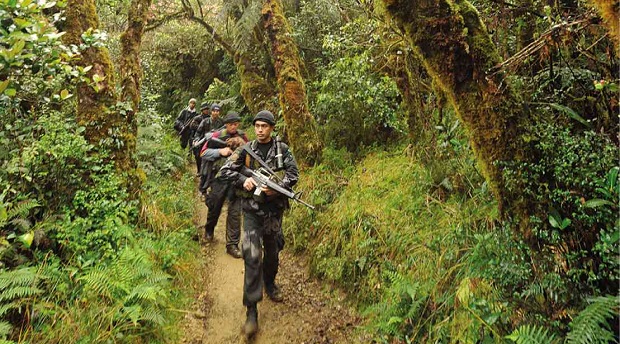
THE CORDILLERA police have been tasked with enforcing forestry laws on communities that have become divided between protecting their forests and expanding their farms. EV ESPIRITU/ INQUIRER NORTHERN LUZON
BAGUIO CITY—From tax declarations and Torrens titles to agrarian reform certificates and, lately, certificates of ancestral domain titles (CADTs).
Any of these legal documents have been used by farmers to penetrate Mount Pulag’s delicate ecosystem, according to a study made by a University of the Philippines Baguio anthropologist.
June Prill-Brett, UP Baguio professor emeritus who conducted the study, said the government had multiple yet conflicting laws for owning property, which some indigenous Filipinos had used to access the protected forests of Mt. Pulag.
In many cases involving tenurial issues in the mountain, the land claimants chose the law that would best serve their interests, Brett said.
Police authorities have been watching the intrusions since October, after the Benguet Peace and Order Council and the Cordillera Regional Law Enforcement Coordinating Committee noted a newly destroyed pine forest in Barangay Ekip in Bokod town, which had been blamed on a farmer from Kabayan town.
The provincial government would face farmers and landowners in court, and at the very slopes of Mt. Pulag, to protect Luzon’s highest peak and richest ecosystem, local officials said last week.
Benguet Representative Ronald Cosalan met with government prosecutors and officials of the Benguet police and the Department of Environment and Natural Resources (DENR) to establish a legal strategy against families that have staked a claim to sections of Mt. Pulag, including beneficiaries of a CADT that covers Kabayan.
In 1987, 11,500 hectares of the mountain were declared a national park under the supervision of the Protected Area Management Board. The area straddles towns in Benguet, Ifugao and Nueva Vizcaya provinces.
But land claimants have since surfaced with tax declarations paid to the town government, Torrens titles, agrarian reform certificates and the CADT and other titles issued by the National Commission on Indigenous Peoples.
Some Kabayan farmers, for example, had been asserting their domain rights despite a boundary conflict with other Benguet towns, including Bokod, DENR officials said.
“I released P4.5 million to DENR [in 2011] for the ground delineation of the Mt. Pulag reservation, but the DENR has not yet completed the work,” Cosalan told the Philippine Daily Inquirer.
He said the delineation would end territorial disputes and set a final demarcation area between vegetable gardens and protected areas where rare plant and animal species thrive.
The Philippine Army has stationed a unit at Mt. Pulag, augmenting a security network set up by forest guards and environmentalists there.
But the tougher job was to deal with people who believe they have been entitled to control and exploit the mountain because of overlapping and contradictory laws, Cosalan said.
In the UP Baguio forum in September, Brett said many agencies, as well as their local government counterparts, had mandates to improve their constituents’ lives that might clash with pure conservation efforts.
The National Integrated Protected Areas System is tasked with enforcing conservation laws in Mt. Pulag, but other laws were also introduced to the communities around the mountain that “changed the whole idea about how people manage their resources,” Brett said.
She said the communities’ local economies also shifted from swidden farming to commercial gardening, and their earning allowed them to send their children to school.
Gardening became a logical enterprise, Brett said. When people are forced to choose between their family’s survival and the Mt. Pulag environment, it is the environment that loses out, she pointed out.
“My objective [in drawing up the Mt. Pulag study] is to show how various legal orders or legal systems, when applied on the same resource, will allow [people] to pick the law which would benefit them,” she said.
“We are looking at people [in Mt. Pulag] who are looking at the laws [which tell them] they cannot do this because of this law, but they can do this because of that law. So they choose their appropriate law,” she said.